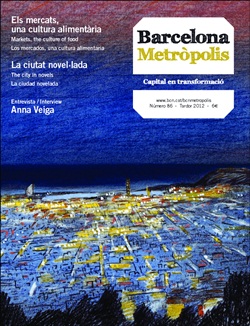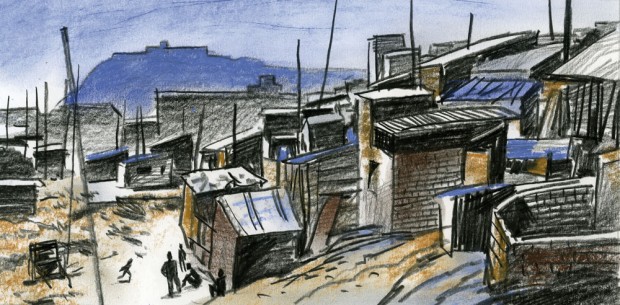Barcelona has been constructed page by page from Miguel de Cervantes to the present day. It is pages and streets, neighbourhoods and ink. It is literature under the indecent lamplight of a brothel. It is more than a city.
Nestled in a Mediterranean corner of the Iberian Peninsula, Barcelona is the most literary city of all. So much so that Don Quixote visited a printer’s there. One need only recall the words that Cervantes placed in the mouth of his most universal character: “Barcelona, the treasure-house of courtesy, haven of strangers, asylum of the poor, home of the valiant, champion of the wronged, pleasant exchange of firm friendships, and city unrivalled in site and beauty.”
From Miguel de Cervantes to the present day, the city of Barcelona has been constructed page by page, defined, as of the last century, by the eyes of Juli Vallmitjana, a now forgotten author, but one who portrayed life on the fringe in a uniquely intense fashion. Gypsies, slums, shanty towns, grubby kids and stagnated water where an epoch that punished Barcelona with the reality of epidemics and famine was submerged. The Barcelona that nobody wanted to know about was denounced by Vallmitjana in his work.
If Vallmitjana has an heir in our times, then that person is definitely Francesc Candel, a son of emigrants who grew up in the hovels of Montjuïc and whose stories are crammed with obscene gashes and flavours. Years later another illegitimate son would be engendered in the shanty town on Montjuïc. I’m referring to Francisco Casavella. Barcelona was Casavella’s mother, bride, wife and something worse: an ex-wife with whom he continued to share a flat, shame and a curt greeting at the bathroom door. Casavella penned some of the best pages about the Barcelona of the end of the last century. Undoubtedly the best narrator of his generation, which is also mine. Juan Marsé also asserts this.
On the subject of Marsé and generations, it must be mentioned that Barcelona would not be Barcelona without the help of Marsé and his aventis (tales) which helped to build the foundations of a city that was ravaged by the Civil War. The aggression suffered by Barcelona at the hands of a Spain rife with privileges was made more bearable thanks to the imaginations of men like Marsé and Francisco González Ledesma, who had to become Silver Kane to entertain the post-war readers. He did so by writing paperbacks for adults, pure action stories in which the hero was a sunburnt and gunpowder-tinged cowboy, but who could just as well have been one of those libertarians who fought to defend their people’s dignity. One of those flesh and blood characters that appear in the memoirs of García Oliver, the militant anarchist who, together with Ascaso and Durruti, formed the Los Solidarios action group, which could only have surfaced in Barcelona, the home of active anarchism.
Having said that, if there is one novel that contains all the other novels of Barcelona, and without which Marsé, Mendoza, González Ledesma or even I would not exist, and is the mother of the contemporary novel written in Spanish – even though it was written in Catalan –, then it is Vida privada [Private Life], by Josep Maria de Sagarra. It is the story of the Lloberola family, an exemplary family that fell upon hard times; a high-class family eaten away and exposed by vice. As I am preparing a novel that is set in Barcelona, I popped the works of Vallmitjana, Casavella, Candel, Marsé, Mendoza, González Ledesma, Josep Maria de Sagarra into my rucksack; in short, the whole gang. All kitted out, I set sail for this literary and real city. Because Barcelona is pages and streets, neighbourhoods and ink. Barcelona is literature under the indecent lamplight of a brothel. Barcelona is more than a city.





Pingback: Torna Barcelona Metròpolis | Núvol